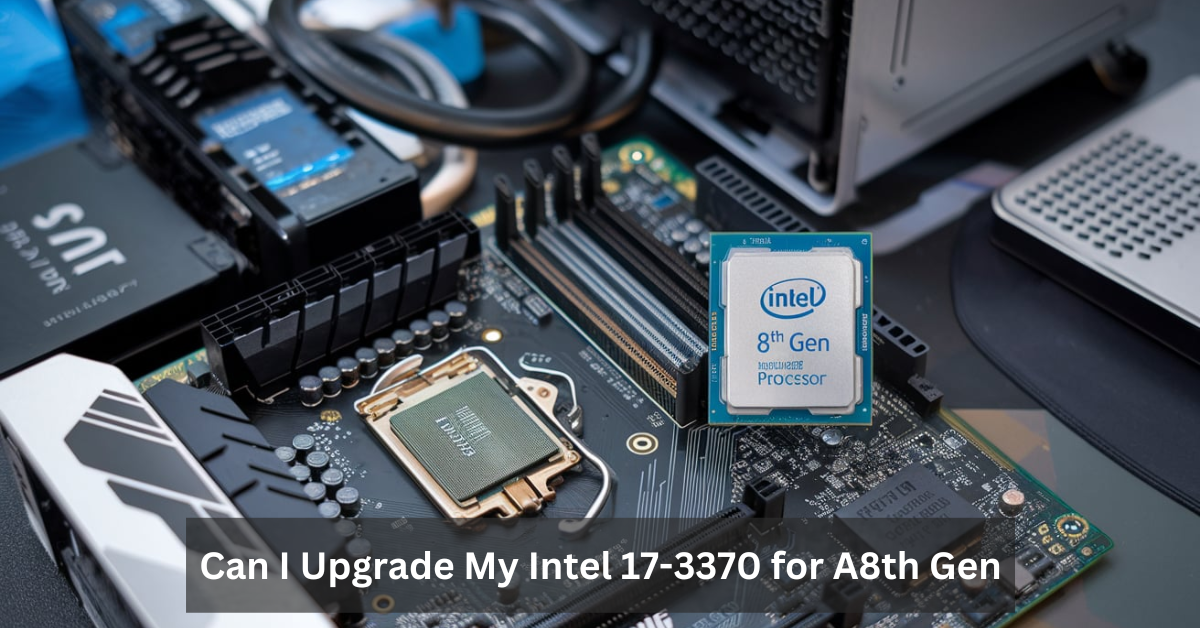Can I Upgrade My Intel 17-3370 for A8th Gen Processor?
Upgrading your PC to meet modern performance demands is an exciting yet challenging process. For many users, a common question arises: Can I Upgrade My Intel 17-3370 for A8th Gen Processor? The answer is not a simple yes or no—it depends on several factors, including compatibility, costs, and performance improvements. This article will guide you through the process of upgrading from the Intel i7-3370, a 3rd Gen Intel processor, to a newer 8th Gen Intel CPU, exploring all the considerations and benefits that come with such an upgrade.
The Intel i7-3370 is a 3rd Gen Intel Core processor, part of the Ivy Bridge family, released in 2012. With its quad-core architecture and hyper-threading support, the i7-3370 was a powerful chip for its time, capable of handling most tasks including gaming, multitasking, and productivity work. However, with technology advancing rapidly, it might be showing its age, especially when compared to the performance gains offered by newer processors.
The Intel 8th Gen processors (Coffee Lake), including the Intel Core i7-8700K, are a significant leap forward in terms of performance. They offer improvements in speed, multi-threading capabilities, power efficiency, and support for faster RAM and storage solutions. Upgrading to an 8th Gen Intel processor can provide a notable performance boost for gaming, video editing, and other CPU-intensive tasks. But before making the leap, it’s important to understand the requirements and compatibility factors involved.
Can I Upgrade My Intel 17-3370 for A8th Gen Processor?
Socket Compatibility Issues (LGA 1155 vs. LGA 1151)
The Intel i7-3370 uses the LGA 1155 socket, while the 8th Gen Intel processors are designed for the LGA 1151 socket. This socket difference is one of the primary reasons why a direct upgrade is not possible. The physical design of the sockets is incompatible, meaning you will need to replace your motherboard to accommodate the newer processor.
Key Differences Between 3rd-Gen (Ivy Bridge) and 8th-Gen (Coffee Lake) CPUs
The 3rd Gen Intel i7-3370 is built on the 22nm Ivy Bridge architecture, which, while efficient for its time, lacks the advanced performance improvements seen in the 8th Gen Intel processors. The 8th Gen processors are built on a 14nm Coffee Lake architecture, allowing for better energy efficiency, faster processing speeds, and improved multi-threading capabilities. This architecture also supports DDR4 RAM, whereas the i7-3370 only supports DDR3 RAM, leading to further upgrade needs.
Performance Comparison: Intel i7-3370 vs. Intel 8th Gen Processors
Upgrading from a Can I Upgrade My Intel 17-3370 for A8th Gen provides substantial performance gains across various metrics. Let’s take a closer look at the differences in terms of single-core and multi-core performance, efficiency, and the impact on gaming and productivity.
Single-Core vs Multi-Core Performance
Single-core performance has seen a marked improvement in 8th Gen Intel processors. This is especially beneficial for tasks that require high clock speeds, such as gaming or running single-threaded applications. However, the real benefit of upgrading to an 8th Gen processor lies in its multi-core performance. The Intel i7-8700K has six cores and twelve threads, compared to the four cores and eight threads of the i7-3370. This makes multi-threaded tasks like video rendering, 3D modeling, and multitasking much faster on an 8th Gen CPU.
Efficiency and Energy Consumption
8th Gen Intel processors are more energy-efficient than their 3rd Gen counterparts. The 14nm process used in 8th Gen chips allows them to consume less power while delivering more performance. This means less heat, better thermal performance, and the possibility of better overclocking performance if you opt for a model like the i7-8700K.
Impact on Gaming, Productivity, and Video Editing
Upgrading to an 8th Gen processor, especially the Intel i7-8700K, will significantly improve gaming performance. Modern titles that require high frame rates benefit from the extra cores and better clock speeds. For tasks like video editing, the 8th Gen processor can handle high-definition content creation more smoothly, speeding up rendering times and multitasking capabilities.
What Upgrades Are Needed for an 8th Gen Processor?
When considering upgrading to an 8th Gen Intel processor, it’s not just the CPU that needs an upgrade. The entire system may need changes to unlock the full potential of the newer chip.
Motherboard Compatibility: Choosing the Right Board for LGA 1151
Since the Intel 8th Gen processors require an LGA 1151 socket, you’ll need a compatible motherboard. Popular motherboards for 8th Gen Intel processors include those based on the Z370 and B360 chipsets. Choosing the right motherboard depends on your needs—if you plan to overclock, a Z370 motherboard would be ideal, while a B360 motherboard offers a more affordable option for non-overclocking users.
RAM Upgrade: From DDR3 to DDR4 for Better Performance
One of the most crucial upgrades is moving from DDR3 RAM to DDR4. DDR4 RAM offers higher speeds, improved bandwidth, and greater efficiency, making it essential for 8th Gen Intel processors. The performance boost in applications, including gaming and content creation, is noticeable when switching to DDR4.
Storage Solutions: NVMe SSDs and M.2 Support
If you’re upgrading to an 8th Gen processor, it’s an excellent time to also look at your storage. Many 8th Gen motherboards support M.2 NVMe SSDs, which provide significantly faster read and write speeds compared to traditional SATA-based SSDs. This upgrade is especially beneficial for tasks such as video editing, where fast storage can dramatically reduce loading and processing times.
Power Supply Requirements: Does Your PSU Need an Upgrade?
An 8th Gen Intel processor might require a slightly higher wattage PSU, especially if you are upgrading your graphics card, adding more storage, or using high-end components. While the power draw of Intel CPUs has decreased in recent years, ensuring that your power supply unit (PSU) is sufficient to handle the load is important to avoid system instability.
How to Choose the Best 8th Gen Intel Processor for Your Needs
When selecting an 8th Gen Intel processor, it’s important to evaluate your needs. The i7-8700K is a popular choice for users seeking top-tier gaming performance and overclocking capabilities, but there are other options, such as the i7-8700 and i5-8600K, depending on your budget and performance requirements.
i7-8700K vs Other 8th Gen Options: Which Is Right for You?
The i7-8700K is the most powerful option within the 8th Gen Intel lineup, boasting six cores and twelve threads. It is designed for users who need the highest performance, especially in gaming and content creation. If you are more budget-conscious, the i5-8600K still offers excellent performance for most users but lacks the hyper-threading capabilities of the i7 variants.
Benefits of Overclocking with Intel 8th Gen Processors
If you choose a K-series processor like the i7-8700K, overclocking can unlock even more performance potential. Overclocking allows you to increase the CPU’s clock speeds beyond the base frequency, which can be particularly useful for gaming or rendering. However, this requires a good cooler and adequate power supply to avoid overheating or system instability.
The Cost of Upgrading: Is It Worth It?
Breakdown of Costs: Motherboard, RAM, Storage, PSU, and CPU
Upgrading your system to an 8th Gen Intel processor isn’t just about buying a new CPU. You’ll need a new motherboard (Z370 or B360 chipset), DDR4 RAM, possibly a new power supply, and maybe even faster storage like M.2 NVMe SSDs. All these costs can add up quickly, so it’s important to weigh the performance benefits against the financial investment.
Long-Term Value and Future-Proofing Your PC
While the upfront cost may be higher, Can I Upgrade My Intel 17-3370 for A8th Gen ensures that your system will remain relevant for years. With future updates to software and games requiring more processing power, having a modern CPU will keep your system competitive in the long run.
BIOS and Firmware Updates: What You Need to Know
Importance of BIOS Compatibility for 8th Gen Processors
Before upgrading to an 8th Gen Intel processor, ensure that your motherboard’s BIOS is up to date**. Older BIOS versions may not support the new generation of CPUs, which could result in system boot failure or incompatibility. Manufacturers often release BIOS updates to enable compatibility with newer processors, so checking for updates is an essential step before installing the new chip.
How to Update Your BIOS Before Installing a New CPU
Updating the BIOS varies by motherboard manufacturer, but the general process involves downloading the latest BIOS version from the manufacturer’s website, saving it to a USB drive, and using the BIOS update utility in your motherboard’s setup menu. Be sure to follow the instructions carefully to avoid any mishaps, as improper BIOS updates can lead to a non-functional system.
Step-by-Step Guide to Upgrading Your Can I Upgrade My Intel 17-3370 for A8th Gen
If you’re ready to upgrade, here’s a step-by-step guide to ensure everything goes smoothly.
Tools and Preparation Needed for the Upgrade
To get started, you’ll need basic computer tools such as a screwdriver, thermal paste, and a static wrist strap (to protect components from static electricity). You’ll also need the new 8th Gen processor, a compatible LGA 1151 motherboard, DDR4 RAM, and any other components you plan to upgrade.
Disassembling Your PC and Installing the New Hardware
First, power down your PC and unplug it. Remove the side panel and start by removing the Can I Upgrade My Intel 17-3370 for A8th Gen Clean the old thermal paste from the heatsink and CPU using isopropyl alcohol. Place the new 8th Gen processor into the LGA 1151 socket of the new motherboard. Apply fresh thermal paste and install the heatsink. Ensure that your RAM and storage devices are also upgraded or reinstalled as required.
Configuring BIOS and Testing the System After Upgrade
After physically installing the new hardware, boot your system and enter the BIOS to ensure that everything is recognized correctly. You may need to adjust settings such as memory speed and boot order. Once you’ve configured the BIOS, reboot into your operating system. Run some basic tests to ensure that the new processor is working as expected, and check for any errors or warnings in the system logs.
What to Do if the System Won’t Boot
If your system doesn’t boot after the upgrade, the most common culprits are incorrect CPU installation, outdated BIOS, or insufficient power. Double-check that the CPU is seated correctly and that the BIOS is updated. Also, ensure your power supply unit (PSU) is adequate for the new components.
Fixing Compatibility Issues with RAM or Motherboard
If you encounter issues with RAM or motherboard compatibility, make sure that your DDR4 RAM is properly installed and that the motherboard is fully compatible with the 8th Gen Intel processor. Sometimes, a BIOS update can resolve these issues, so it’s worth rechecking that the BIOS is up to date.
How to Ensure Maximum Performance After the Upgrade
Once everything is working properly, ensure that your system is optimized for peak performance. This includes installing the latest drivers for your motherboard, graphics card, and other components. Also, adjust your power settings in the operating system to ensure that the CPU is running at full potential. For gaming, ensure that your NVIDIA GeForce GTX/RTX GPU drivers are up to date to complement the performance of your new processor.
Conclusion
Can I Upgrade My Intel 17-3370 for A8th Gen offers significant benefits in terms of performance, efficiency, and future-proofing. While the process may require several additional upgrades—such as a new motherboard, RAM, and possibly a power supply—the end result is a much faster and more capable system that can handle modern games, productivity tasks, and content creation with ease.
Upgrading to an 8th Gen Intel processor is an investment that will pay off in terms of performance and longevity. Your PC will be better equipped to handle new software, games, and multitasking needs, ensuring that your system stays relevant for years to come. Whether you’re gaming, working with high-definition video, or simply looking to improve your overall PC performance, the upgrade to Intel Core i7-8700K or similar processors is certainly worth considering.
By following this guide, you’ll be well on your way to making your PC faster, more powerful, and more future-proof. The upgrade may require some upfront cost and effort, but the rewards—both in terms of productivity and enjoyment—are undeniable.
Frequently Asked Questions
Can I upgrade my Intel i7-3370 to an Intel 8th Gen processor directly?
No, the Intel i7-3370 uses an LGA 1155 socket, while 8th Gen processors require an LGA 1151 socket, so you will need a new motherboard to make the upgrade.
Is upgrading to an 8th Gen Intel processor worth it?
Yes, upgrading to an Intel 8th Gen processor offers substantial improvements in multi-core performance, energy efficiency, and gaming performance. It’s an excellent choice for users looking to future-proof their systems.
What are the main components I need to upgrade for an 8th Gen processor?
You will need to upgrade your motherboard, RAM (from DDR3 to DDR4), and potentially your power supply. You might also want to upgrade to an M.2 NVMe SSD for faster storage.
How can I make sure my BIOS is compatible with the 8th Gen processor?
Check the motherboard manufacturer’s website for BIOS updates that enable compatibility with 8th Gen Intel processors. Updating the BIOS is essential before installing the new CPU.
Will upgrading to an Intel 8th Gen processor improve my gaming performance?
Yes, upgrading to an Intel i7-8700K or another 8th Gen processor will improve gaming performance by offering more cores, better clock speeds, and improved overall efficiency, resulting in smoother gameplay and higher frame rates.
Stay in touch to get more updates & alerts on Ancient-Artz! Thank you






